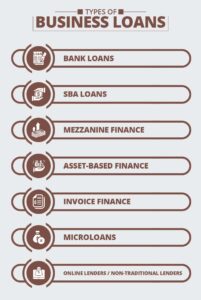Most of the successful businesses today started small and acted strategically in their situations to achieve heights. Many people try to achieve success in their business, but due to multiple reasons, they may have dropped their ambition in the mid-way.
Every idea of a startup gets stuck up when it comes to financing nearly. According to a report by Fundera, 29% of small businesses fail because they run out of capital and it’s not easy to find investors as only 48% of small businesses meet their overall financing needs. Fortunately, there’s always an option in the form of a loan for entrepreneurs to start up their businesses.
A business loan is a loan specifically offered for business purposes. With all loans, it involves the creation of a debt, which is repaid with added interest. There are several different types of business loans which are discussed below.
TYPES OF BUSINESS LOANS

-
Bank Loans
This is the first and foremost idea that strikes when approaching a loan for a company. As the name suggests, a business obtains loans from a bank that can either be secured or unsecured.
For secured loans, banks demand collateral, which may be ceased if repayments are not made at a time along with the business’s accounts, balance sheet, and business plan, as well as studying the principals’ credit histories. For unsecured loans, banks do not demand anything; the interest rates tend to be higher as there are no collaterals involved.
-
SBA Loans
Small Business Administration (SBA) does not lend loans itself; instead, it guarantees loans made by individual lenders. It sets guidelines for loans assigned by its partnering lenders and community development organizations. The crucial thing that makes this loan more desirable is that it reduces risks for lenders and makes it easier for them to access capital, making it simpler for startups and small businesses to acquire loans. As per 2021 reports by Fundera, SBA loans or lines of credit have a whopping 55% approval rate.
-
Mezzanine Finance
Mezzanine finance is a hybrid of debt and equity financing which means it effectively secures a company’s debt on its equity, allowing the lender to claim part-ownership of the business if the loan is not paid back on time. This allows the business to borrow without putting up other collateral, but risks diluting the principals’ equity share in case of default.
-
Asset-based Finance
Asset-based financing involves borrowing against one of the company’s assets, with the lender focusing on the quality of the collateral rather than the credit rating and prospects of the company. A business may borrow against several different types of assets, including premises, plant, stock, or receivables.
-
Invoice Finance
In this financing, businesses borrow money against the payment due from the customers. They pay a share of the invoice amount to the financier as collateral for borrowing the money. Invoice financing can solve problems associated with customers taking a long time to pay as well as difficulties obtaining other types of business credit.
-
Microloans
Microloans are smaller loans, typically availed by startups, micro-enterprises, and small businesses with low capital requirements. Businesses take microloans to start a new business, maintain cash flow, debt consolidation, and manage other day-to-day expenses.
-
Online Lenders / Non-Traditional Lenders
There has been an increase in the number of online lenders offering loans to small businesses. Some online lenders lend loans from their capital while some may use a “marketplace” model, in which they match borrowers to loan products from a variety of lenders. The popular business loan that online lenders offer includes term loans, lines of credit, and merchant cash advances. This method has grown and will keep growing due to the fast process and minimum documentation it requires.
HOW TO GET A BUSINESS LOAN?
If you had been rejected for a business loan earlier to boost your startup, here we have put together some of the important tips that can help you get your business loan approved.
-
Present a strategic plan
The money lenders will decide whether they want to give you a loan based on the business plan you will represent and the projection of the success rate of your business.
Hence it is important to convince the lenders with a well strategic plan. Create a detailed plan including cash flow projection and how the money will be used for machinery and business operation.
-
Check All Requirements
Every bank has set requirements that an applicant must fulfill. Instead of facing loan rejection unnecessarily, ensure that you qualify for each criterion and make your business application vibrant. The general criteria are minimum turnover of the past business, minimum and maximum age, minimum annual income, and the number of years in business.
-
Prepare Proper Documents
Most of the business application rejections happen due to incomplete documents. Make sure that certain items are added to your business loan application. These are:
- Cover letter
- Collateral
- A detailed description of your business plan
- The loan amount and its usage
- Your credit history
- Details of your management team
- Financial statement
-
A Good Credit
Lenders generally access your credit report as part of the loan process to check your credit health. A good credit score earns you a business loan at better terms while a bad credit history can reduce the approval rate. Make sure you have not defaulted in your previous borrowings and maintained good credit health.
-
Understand The Process
Different lenders lend business loans based on your need and the size of the business. Apart from banks, there are NBFCs, online lenders, etc. It is important to know about the lending process in each platform and apply only to the lender who can lend to you based on your need despite the shortcomings in your credit history.
BENEFITS OF A BUSINESS LOAN
-
Quick Approval
Some banks approve a Business Loan quickly so that you don’t need to worry about operations coming to a halt or growth plans being delayed because of a lack of funds. Quick approvals to loans give you a boost to plan and implement more strategies for your business thereby helping you to generate more revenue. You can always responsibly pay off the loans easily as the business is earning profits.
-
Documentation
Business Loans don’t require lots of paperwork. In some cases, customers get loans without any collateral, or security to meet their every need, from expansion to working capital requirement. You can also get doorstep services from some banks.
-
Reasonable Interest Rate
Because of the increased competition between banks, the interest rates on Business Loans are quite reasonable, so that you can take out a Business Loan without worrying about large repayments. Of course, interest rates that banks charge will vary from customer to customer, according to creditworthiness, tenure, and the purpose for which the Business Loan is required.
-
Flexible Tenures
Loan takers have the option of choosing the tenure of the loan. If you want to take out a Business Loan for a short period to meet working capital expenses, you can take a loan for a year. If you want to expand your business, you can take out a loan for a longer period, like, say, four to five years.
DISADVANTAGES OF LOANS
-
Strict Terms and Conditions
Bigger loans will have certain terms and conditions or covenants that you must adhere to, such as the provision of quarterly management information.
-
Lack of Flexibility
Loans are not likely flexible – you are often made to pay interest on funds you’re not using.
-
Difficult to Repay
You could face trouble making monthly repayments if your customers don’t pay you promptly, causing cash flow problems.
-
Risk of Losing Collaterals
In some cases, loans are secured against your possessions. The interest rates for secured loans may be lower than for unsecured ones, but your assets or home could be at risk if you cannot make the repayments. According to recent reports, 33% of loan applications are declined because of insufficient collateral to secure the debt.
-
High-Interest Rate
Sometimes, interest rates can be quite high that it becomes very difficult to repay them responsibly. In some cases, businesses also end up paying off the interest only, rather than the loan itself.
TO WRAP IT UP
So there are always benefits and disadvantages to everything and loans are no different. The key to accessorizing loans into assets for your startup is to learn and look after these points before coming to a decision.




